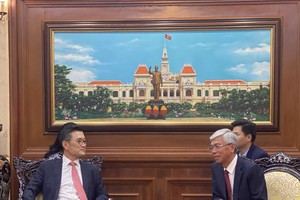KINGSTON, May 25 (AFP) – Trucks laden with bodies rushed to hospitals in Jamaica's capital as the government vowed an all-out assault to nab a powerful alleged drug kingpin barricaded by his gang in the teeming slums.
Hospital sources said they saw more than 60 bodies, although police put the death toll at 27. But Prime Minister Bruce Golding warned the figures would likely rise, and police late Tuesday reported several murders.

Gun-toting troops and police circled the streets into the night as rain descended on Kingston, an impoverished Caribbean city ringed by mountains that is a world away from the sun-kissed beaches for which Jamaica is best known.
Supporters set up tree branches, old cars and even abandoned refrigerators to form makeshift barricades to seal off the stronghold of local don Christopher "Dudus" Coke, who is wanted by the United States on drug charges.
Coke has developed a loyal following among some slum-dwellers, who see him as a savior for offering jobs, education and security that are sorely lacking. He also had developed ties with the political establishment.
But after months of stalling, Golding on Sunday declared a state of emergency to arrest Coke, declaring a battle to rid this nation of its image as one of the world's murder capitals.
"The violence that has been unleashed on the society by armed, criminal elements must be repelled," Golding told a heated session of parliament, where opposition members accused him of creating the crisis by earlier inaction.
"The operations being carried out under emergency powers are an extraordinary response to an extraordinary challenge to the safety and security of our citizens," Golding said.
But he pledged to investigate any excesses in the assault, which is being carried out by police and troops backed by clattering helicopters.
"The government deeply regrets the loss of lives of members of the security forces, and those of innocent law-abiding citizens who were caught in the crossfire," Golding said.
With violence turning some of the city's slum areas into a war zone, three trucks loaded with bodies, including a baby, unloaded their grim cargo at a morgue in one of the main hospital complexes, witnesses said.
Gunfire rattled around the city, as plumes of smoke hung above Tivoli Gardens which Coke's supporters had barricaded last week to thwart his arrest.
Hospital officials told AFP that early Tuesday two trucks bearing "about 50" bodies had been unloaded at the morgue at the Kingston Public Hospital.
An AFP correspondent saw a third truck arrive full of bullet-riddled corpses, including a baby, later in the day. A nurse said there were 12 bodies inside, and they came from a different area to the east of the city called Mountain View.
Police also told AFP they have detained 211 people, including four women.
But National Security Minister Dwight Nelson told a press conference that Coke, 42, had not yet been detained.
"Up to the last briefing I got, the answer is no," Nelson said.
Federal prosecutors in New York last year accused Coke of running an armed network that has been a major supplier of cocaine and marijuana to New York and other US cities.
With rumors swirling among Kingston residents of US support for the effort to arrest Coke, both the US and Jamaican government insisted that the operation was primarily local.
State Department spokesman Philip Crowley said in Washington that the main support offered by the United States was bullet-proof vests.
Coke calls himself a mere businessman. But the battle to capture him threatens dire consequences for an already troubled economy.
Tourism officials have voiced alarm at the damage to the image of Jamaica, where a million tourists each year flock to beaches to soak up some sun and the sounds of reggae music.
Tourism brings in valuable hard currency to Jamaica. Yet most tourists do not venture into Kingston, long considered the most dangerous part of a country that has 1,700 murders a year for a population of 2.8 million.
Britain, Canada and the United States all warned their citizens against travel to Kingston.
Authorities declared that most schools would remain closed for a second day on Wednesday. Monday, the first full day since the assault, was a public holiday.
Most Kingston residents heeded calls to stay indoors -- and those who didn't found little to keep them on the streets.
"For me, this situation just mean no business," said a woman named Janice who ambled through deserted streets with a stack of unsold tabloid newspapers on her head, the headline reading, "Taking Back Tivoli."
























